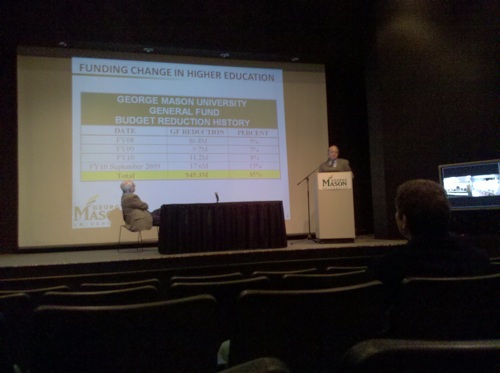University Discusses Proposed Budgets in Richmond

Provost Peter Stearns, left, and Senior Vice President Morrie Scherrens, right, held a town hall budget forum for faculty in the Johnson Center Cinema last Wednesday. Over 200 people were present to hear the proposed budgets and their effects on the university.
(Photo via camera phone by C2M Executive Editor Kevin Loker)
---------------------------------------------
Wounded from recent economic troubles, current plans in Virginia’s General Assembly regarding the state’s budget and higher education may leave George Mason University students, faculty and staff stuck with more financial burden. In the proposed budgets, Mason faculty and staff would face a combination of furloughs, stagnant pay and general reductions in research funding —and students would face a projected tuition and fees increase between eight and 10 percent each year for the next three years.
During a town hall budget forum for faculty last Wednesday, Provost Peter Stearns and Senior Vice President Morrie Scherrens discussed options for combating the state budget cuts, options that, without attention in the present, would prevent the university from fully functioning in the future.
“During the past snowstorm, many of you probably had the same experience as I had. My son asked me after I had shoveled the driveway about four or five times – or six or eight times, rather – he said, ‘Do you really enjoy shoveling snow, being from Michigan, or are you just glad to get it done?’” said Scherrens, creating an analogy to the university’s financial situation.
“I had never heard the question phrased that way before, but when I thought about it, every time I went there it was at least semi-manageable,” said Scherrens. “And I knew that if I didn’t shovel it – and just stayed in and screwed around all day – at some point, it would become [un]manageable.”
Options discussed at the forum outlined what both the Virginia House of Delegates and Senate of Virginia versions of the state budget proposal would mean for the university. The process for determining one legislative proposal has begun, and more details will arise depending on the legislative session ending. Stearns and Scherrens expect more information come late March or early April.
For faculty, the Senate version of the budget would call for employees to take one furlough day in the current fiscal year, and three each year in the fiscal years 2011 and 2012. The House version calls for no furloughs, but makes up the loss in further general budget cuts.
“One has it in and one has it out, but it’s our position . . . to at least plan for the one day of furlough,” Scherrens said. “It’s crazy to go into the final quarter [not knowing what] the plans are,” said Scherrens. Plans for one day of furlough involved both sides of the Memorial Day weekend, but they are subject to change depending on the legislative outcome.
For students, the effect seems more predictable. According to Scherrens, despite differences between the House and Senate, the university looks like it will have to make a prognostication that the tuition students’ pay will increase somewhere in the eight to 10 percent range each year for the next two or three years.
“I don’t see any way that’s going to get better,” said Scherrens.
Those that live in-state may bear another burden. While the House version calls for no such action, the Senate version calls for an imposed capital fee of $2.50 per credit hour for all in-state students.
“That would be a proposed increase beyond what we would increase tuition,” said Scherrens. According to Associate Vice President of Budget and Planning Donna Kidd, the imposed capital fee would generate an additional $1.4 million from George Mason University.
“I’m not sure what the chance of [the capital fee increases] are,” said Scherrens. “I hope they’re not good. These students are already paying [and] picking up their share.”
Both versions of the budget would also affect financial aid. According to Kidd, current state funding for financial aid will continue, but there is no additional funding allocated in the projected budget to help support additional needs or to help cover the tuition increases.
“Generally, each year, part of the [state] budget allocation will allocate for . . . financial need students,” said Kidd. “This is the first year we can remember [when] funds were not allocated for financial need, and for the next years, the legislature haven’t [either].”
Despite all predictions and projections, the provost emphasized that no proposal has been formally passed by the state legislature or approved by the governor.
“It’s really important to stipulate that, while we’re talking about the budget situation in relation to determination in Richmond . . . nothing is yet settled. We don’t know how [final resolutions] will come out,” said Stearns at the budget forum last week. “But it is really, really important to emphasize that almost everything we say today is pretty limited with regard to any specifics.”
“We don’t know some of this stuff, and nobody knows some of this stuff,” he said.
